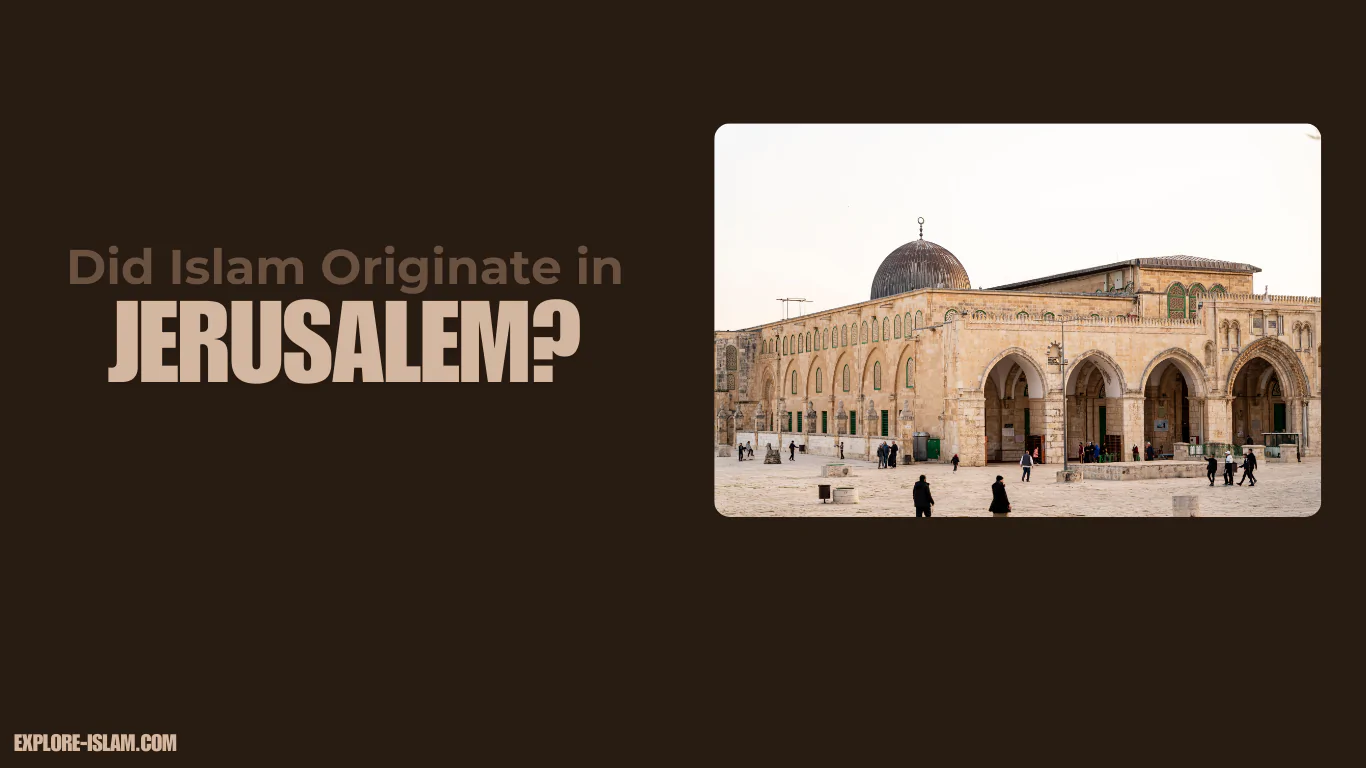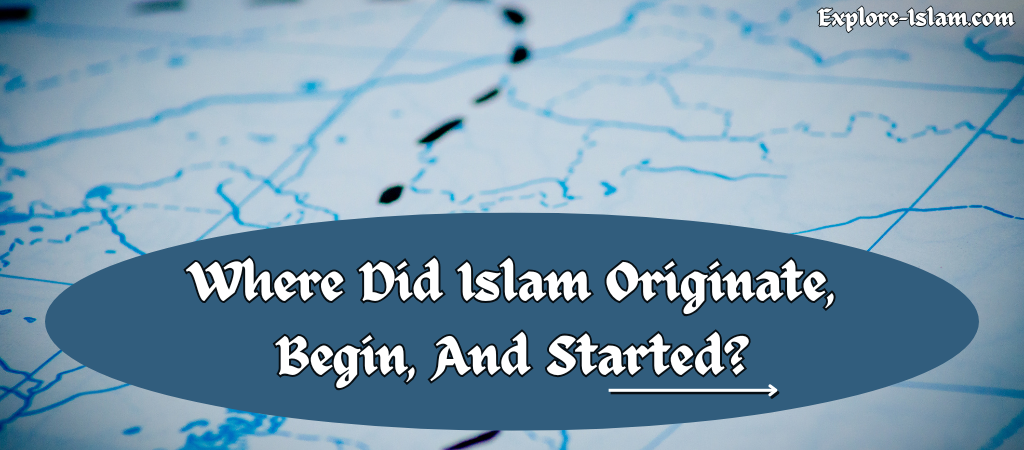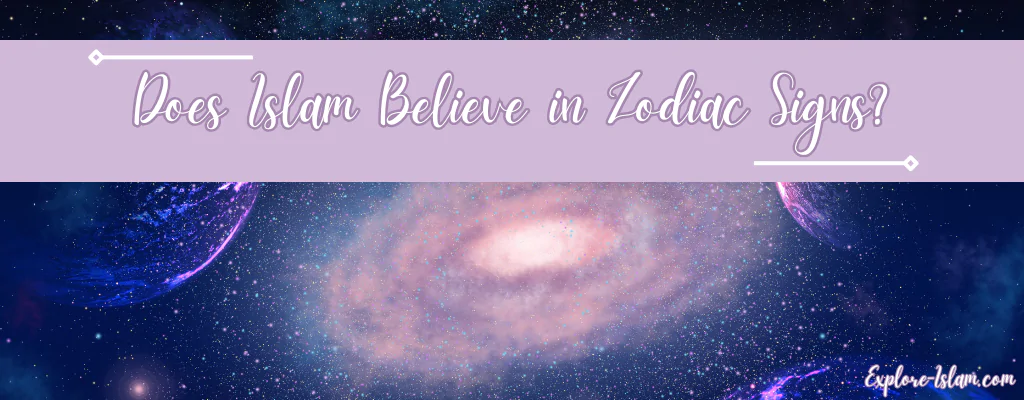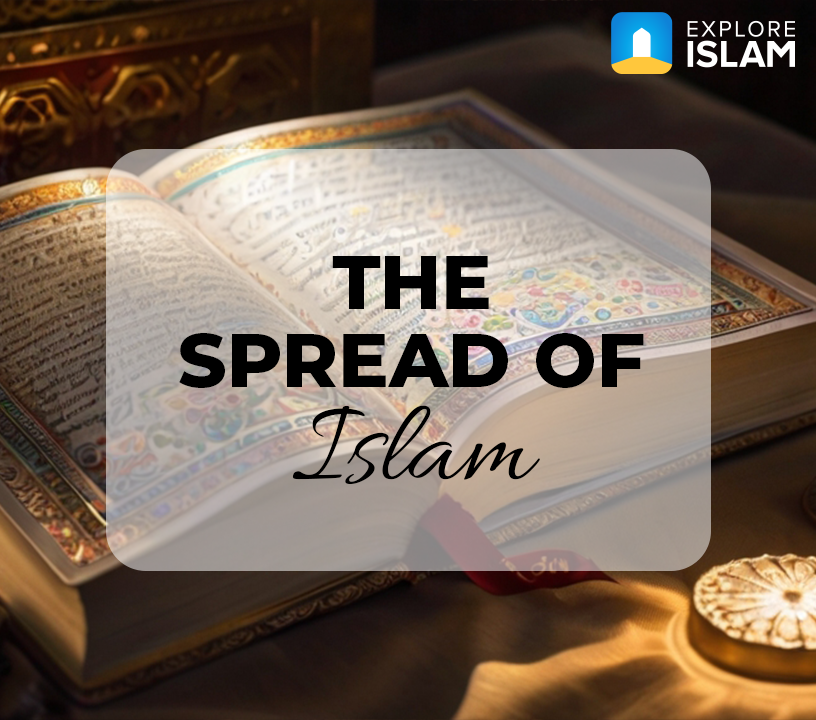In recent years, the question “Did Islam originate in Jerusalem?” has surfaced, with some writers proposing alternative theories about Islam’s origins. Popular among these is the claim that Islam may have started in Jerusalem or north of Mecca. Promoted by writers like Tom Holland, these theories challenge Islam’s historical foundations, questioning the authenticity of its texts, the locations of key events, and even the biography of Prophet Muhammad. Holland’s thesis claims the Quran may be derived from earlier texts and casts doubt on whether early Islamic sites and practices align with traditional sources.
This article addresses these claims by presenting seven key facts that debunk the myth of Islam’s origins outside Mecca. Supported by strong historical and religious evidence, Mecca is firmly established as the birthplace of Islam. Documented in both the Quran and the Bible, Mecca’s role is further evidenced by early mosques oriented toward the Kaaba and preserved accounts of Prophet Muhammad’s life. The Quran, revealed in Arabic, is divinely preserved alongside prophetic traditions safeguarded through a rigorous system of narration.
The article also highlights the revered place of Jerusalem in Islamic history, especially through Prophet Muhammad’s Night Journey, underscoring his truthfulness and the transparency of Islamic tradition. Despite “revisionist” claims, Islam remains the fastest-growing religion, divinely chosen to guide humanity. Keep reading for deeper insights!
Who invented the Theory That Islam Originated in Jerusalem?
One of the misconceptions, primarily developed by Tom Holland with earlier allegations raised in the widely criticized book Hagarism by Patricia Crone and Michael Cook, and later reaching its peak through Dan Gibson, is that the Muslim birthplace and qibla was Petra for decades before it was relocated years after Prophet Muhammad’s death. Gibson built his false theory on an alleged investigation into some early mosques facing Petra. Yet, Gibson’s theory is falsified for many reasons:
- No historical records support Gibson’s claim.
- The idea is rejected in academic circles by well-known scientists in the field such as David King.
- Mecca, Jerusalem, and Perta are line-up in direction with slight variation, making it reasonable to see some mosques appear to face Petra or Jerusalem–with no intention–since it is already the same direction of Mecca. For example, for those in the south, both Mecca, Jerusalem and Petra will be in the north for them, as shown in the following image:
Academic Rejection of the Jerusalem Birthplace Claims for Islam
Claims suggesting Islam originated outside Mecca, notably proposed in Hagarism by Michael Cook and Patricia Crone, have been widely dismissed in academic circles. Key criticisms include:
- David King: In his book “The Petra Fallacy” and other papers coming after, King proves that Kaaba in Mecca is the direction of prayer debunking the unscientific background and methodology used by Gibson to build his modern fallacy of a different birthplace for Islam in Petra.
- Robert B. Serjeant: Critiqued Hagarism as “bitterly anti-Islamic” and “anti-Arabian,” stating the book’s ideas are “so ridiculous” and out of touch with contemporary research on Islam.
- Hagarism Authors’ Retraction: By 1991, both Crone and Cook had retracted their work, with Crone admitting: “We were young, and we did not know anything.” Despite this, some “revisionists” continue to disregard early Muslim sources.
- Robert Hoylland’s Critique: In New Documentary Texts and the Early Islamic State, Hoylland argues that Islamic history is well-supported by evidence from non-Muslim sources, inscriptions, and archaeology. He emphasizes the “robust historical memory of the Muslim community,” making scenarios that imply a total historical discontinuity—like questioning the existence of Muhammad, the Arabic origins of the Qur’an, or Mecca’s location—difficult to justify, noting that such theories “rely on absence of evidence.”
Did Islam Originate in Jerusalem?
Islam did not originate in Jerusalem or anywhere else in Northwest Arabia. These allegations developed by some modern orientalists contradict established historical, geological, and Islamic traditions. In fact, Islam began in Makkah (Mecca) when Almighty God revealed the first verses of the Quran—God’s final and noble message to humanity—to the Prophet Muhammad (PBUH).
Here are key facts that debunk the myth of Jerusalem being the birthplace of Islam’s revelation:
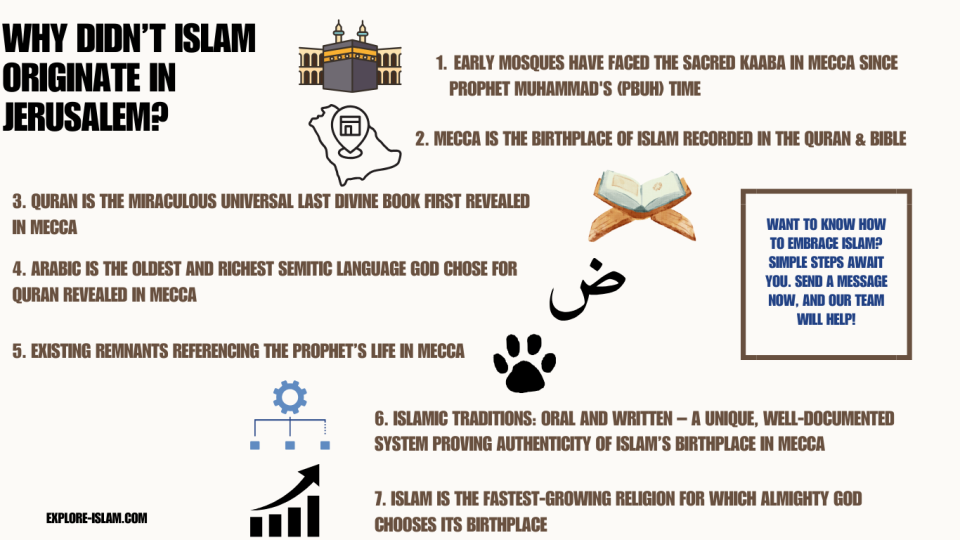
1. Early mosques have faced the Sacred Kaaba in Mecca since Prophet Muhammad’s (PBUH) time
Early Muslims relied on astronomical horizon phenomena to build their mosques; so comparing their historical methods to the accurate qibla directions based on modern geographical coordinates, available only in the 19th century, is unreasonable.
Islam does not oblige Muslims to face the pinpoint qibla if they cannot see the Kaaba or are unable to decide on the exact pinpoint. Rather, they can face the general direction of kaaba with some degrees of deviation, as Islam is built on ease.
Thus, it is clear that early mosques did indeed face the Sacred Kaaba in Mecca.
2. Mecca is the birthplace of Islam recorded in the Quran & Bible
The Valley of Mecca is mentioned as a proper name in the Quran and the bible. Here are the references from each of them:
A. Mecca in the Quran:
Mecca is mentioned in the Quran by its exact name and description:
- Mecca: this name is mentioned once in the following verse:
“And it is He who withheld their hands from you and your hands from them within [the area of] Makkah” (Quran translated meanings, 48:24)
- Bakka: Another name of “Mecca” is mentioned once in the Quranic verse (3: 96):
“Surely the first House ˹of worship˺ established for humanity is the one at Bakkah—a blessed sanctuary”
According to Ar-Raghib, the famous Muslim scholar concerned with Arabic roots of the Qurannic words and other linguists, it was named Bakka due to ‘tabākk,’ meaning congestion, as people crowd there for ṭawāf (the circumambulation around the Kaaba). It is also said that Makkah was called Bakka because it ‘breaks the necks of tyrants’ if they commit injustice there.
The Arabic root for Bakka is (بَكَّ) with a mushaddad kaaf letter, and it has nothing to do with weeping; weeping has another Arabic root of (بَكَى) ending with alif maqsurah letter.
Moreover, Mecca is mentioned by description many times in the Quran:
- “The secure city” is mentioned once in (95:3)
- “ Mother of Cities” is mentioned twice in (42:7) and (6: 92).
Thus, Mecca is mentioned by name and description in the Quran fitting its current place throughout history.
B. Mecca in the Bible
The “Valley of Baca” is mentioned in the Bible as a proper noun for the location of the Sacred House of God with a description fitting Mecca not Northern Arabia.
Psalm 84:6 (New International Version & King James Version) explicitly mentions “Baka,” just as in the Quran:
“Blessed are those whose strength is in you,
whose hearts are set on pilgrimage.
As they pass through the Valley of Baka.” (Psalm 84:5-6, New International Version)
The “Valley of Baka” is capitalized as a proper noun. However, some Arabic and Middle Eastern Aramaic versions distort the name, translating it as “(وادي البكاء) the valley of weeping”—a place that doesn’t exist on any map or certified Bible version.
C. Description in references matches Mecca, not Petra
Furthermore, the description of the Valley of Baka matches Mecca, as millions of Muslim hearts have longed for pilgrimage there since the beginning of Islam. This fulfilled the supplication of Prophet Abraham (PBUH):
“Our Lord! I have settled some of my offspring in a barren valley, near Your Sacred House, our Lord, so that they may establish prayer. So make the hearts of ˹believing˺ people incline towards them.” (Quran, 14:37)
Therefore, the earlier references to Mecca refute the claims made in Gibson’s Petra theory, which suggests that the first Ka’ba was located in Petra. Gibson asserts that the ancient name of the Petra valley was “Becca” (referring to weeping), with Safa and Marwa located in that valley.
However, these claims are proven inaccurate based on the linguistic root of the word, which has no connection to weeping as a proper noun, as well as the historical records of Mecca and Petra. The remnants in the real Mecca—such as the two mountains, Safa and Marwa—align with the Islamic narrative, debunking the theory.
Read also:
- Who wrote the Bible?
- Who Wrote The Gospels of Matthew, Mark, Luke, and John? The New Testament
- What does the Quran say about the Bible?
3. The Quran is the miraculous universal last divine Book first revealed in Mecca
The Quran is the last divine message that Almighty God revealed to His last Messenger Muhammad (PBUH) to guide all humanity–not only makkans or even those living in the Prophet Muhammad’s time–until the end of the world. Quran revelation started in Mecca then comes according to the context of the prophet’s life. Provided are a group of facts related to Quran revelation and context suitable to Mecca and its surroundings, not Jerusalem:
- Quran’s main purpose is guidance. By understanding this context, fair researchers find that all the stories, themes, and information in the Quran serve its main purpose.
- Mecca was a trade center where people came from different places for trade during the pilgrimage to the Sacred House. Its people were known for traveling and contact with other regions and cultures.
- The Prophet Muhammad migrated from Mecca to Medina, and the Quran continued to be revealed in different places and contexts of the Prophet’s life—showing that the Quran’s revelation was not limited to Mecca settings.
- The Quran directs people to travel for moral lessons. Almighty God says: “Say, ‘Travel throughout the land and see the fate of the deniers.’” (6:11)
Ignoring these facts, Tom Holland and the like alleged that the birthplace of Islam is not Mecca since there is a mention of fruits, animals, or names of nations in the Quran that do not fit the Mecca setting suggesting that there is another place in Northern Arabia for being the birthplace of Islam.
To learn more about the evidence of the divinity of the Quran, read these articles:
- Who Wrote the Quran?
- The Compilation And Standardization Of The Quran – Full Guide
- What Is An-Nasikh and Al-Mansukh: 11 Questions on Quran Abrogation in Islam
- Quran Mistakes: How Many Mistakes Are There In The Quran?
4. Arabic is the oldest and richest Semitic language God chose for Quran revealed in Mecca
Suggesting that the language of the Quran is not Arabic–but Aramaic–is another fallacy developed by those alleging another birthplace for Islam. They suggest that the Quran includes words that are better suited to Jerusalem and Petra or are borrowed from Aramaic found there. However, here are some facts related to the Arabic language and the situation of Aramaic at the Quran’s time of revelation falsifying these claims:
- Arabic is the oldest Semitic language. Eqlimis Yousuf Dawood, the renowned Syriac scholar, stated in his book The Longing Glitter of Syriac Language Grammar: “Arabic language, admittedly, is the noblest, oldest, and richest Semitic language. Learning Arabic is a must for those who want to learn other Semitic languages.” Thus, Syriac language can’t be understood except by referring to the Arabic root due to its rich letters, derivations and points of articulation.
- Aramaic was not as widespread by the late sixth century CE contrary to what Luxenberg claimed. Greek had replaced it in many areas.
- Rejection of theory in scientific fields: The theory suggesting the Quran is based on the Aramaic language—developed by Luxenburg and others—is rejected in scientific fields, including those of non-Muslim specialists. In this context, Federico Corriente noted: “Neither the sources of the history of Early Islam nor trustworthy reports on the socio-linguistic situations of Arabia in those days appear to support Luxenberg’s claims…”
- Lexical borrowing is a scientifically proven and common process across languages. Many Quranic words with roots in other languages have entered Arabic over time, integrating into Arabic lexicons and becoming part of the language’s heritage used and understood by Arabs. This natural linguistic phenomenon is well-known among specialists and is not unique to Arabic. This linguistic phenomenon found in the Quran and in the Arabic heritage even before Islam has nothing to do with the divine origin of the Quran revealed in a clear Arabic tongue.
Thus, the Quran is revealed to Prophet Muhammad (PBUH) in “in a clear Arabic tongue” as mentioned in verse (26:195).
5. Existing Remnants Referencing the Prophet’s Life in Mecca
Remnants from the life of Prophet Muhammad in Mecca and surrounding areas, such as Medina, still exist today, showing that his life in Mecca is not a myth created by later generations. Key historical sites include:
- Al-Masjid an-Nabawi in Medina: The mosque was built where Prophet Muhammad (PBUH) migrated and established the Islamic country.
- Al-Baqee’ Cemetery: Where many of the Prophet’s companions are buried, as referenced in prophetic sayings.
- Expedition Sites: Locations of expeditions documented during the Prophet’s life prove his existence in Hijazi region.
- Uhud Mountain: Associated with the Battle of Uhud happened near Medinah.
- The Seven Mosques (Masjids): Built around the site of the Battle of the Trench, with remnants still visible today.
- House of Khadija in Mecca: The residence of the Prophet’s wife.
- Mountain Pass of Abu Talib in Mecca: Linked to events during the Prophet’s early life.
- Inscriptions at Mount Salʿ, Medina: Bearing names of the Prophet (PBUH) and his companions Abu Bakr, ʿUmar, and ʿAli. For more inscriptions documenting early Islamic history, refer to this resource.
Additionally, modern Muslim scholars have documented some of these sites with many others, as seen in the video “Mecca at the Dawn of Islam, 600AD Map!”, and its accompanying book, which features maps, images, and extensive details about Mecca during the Prophet’s time. The Dar al-Madinah Museum also houses valuable documentation of Makkah, Medina, and early Islamic history, with a detailed video available on YouTube.
6. Islamic Traditions: Oral and Written – A Unique, Well-Documented System Proving Authenticity of Islam’s Birthplace in Mecca
Islamic history and traditions have been preserved through a meticulous and authentic chain of narration, leaving no room for forgery or alteration to be hidden due to strict documentation measures. Despite claims from orientalists like Holland, who argue there is no written evidence from early Islam to substantiate the life of Prophet Muhammad (PBUH), the birthplace of Islam, or the core tenets of Islam, numerous early written records refute this theory:
- Saheefah Saadiqah: Compiled by Abdullaah Ibn ‘Amr ibn al-Aas during the Prophet’s lifetime, containing around 1,000 prophetic traditions and preserved accurately.
- Saheefah Saheehah: Compiled by Humaam Ibn Munabbih, a student of Abu Hurairah, recording traditions he learned from his teacher. Copies of this manuscript are held in libraries in Berlin and Damascus.
The oral transmission of Islamic traditions is equally robust, relying on an unbroken chain of authentic narrators rigorously evaluated by specialized scholars. For further information on the methods developed by Muslim scholars to safeguard Islamic traditions, see M. M. Azami’s Studies in Early Hadith Literature (2001).
Also, to learn more about the collection of prophetic traditions, read Hadith Collection – Was Hadith And Sunnah Compiled And Preserved From Corruption?
7. Islam is the fastest-growing religion for which Almighty God chooses its birthplace
Islam, the religion of Almighty God, was conveyed by Prophet Muhammad (PBUH), who was divinely chosen to bring the message of Islam to humanity. As such, Mecca, the birthplace of Islam, was selected by God, who best understood the ideal setting for its inception. In the same way, God has chosen the appropriate birthplace, messenger, and context for each divine message preceding Islam.
A 2017 study revealed Islam as the fastest-growing religion globally. According to the Pew Research Center, there were 1.8 billion Muslims worldwide in 2015, comprising about 24% of the global population. While currently the world’s second-largest religion, Islam’s growth rate surpasses all others, with Muslims projected to outnumber Christians by the end of this century if current trends persist. Have you ever wondered what unique strengths enable Islam to thrive, even amid global opposition?
Read also:
In summary, strong historical and religious evidence supports Mecca as the birthplace of Islam, an established fact recorded in both the Quran and Bible. From early mosques aligned toward the Kaaba to preserved remnants of the Prophet’s life, Islam’s roots are firmly tied to this sacred city. Also, the Quran, revealed in the rich and ancient Arabic language, is the final universal divine text, preserved along with prophetic traditions through a rigorous system. Despite these myths trying to rewrite the history of Islamic religion, Islam remains the fastest-growing religion, chosen by Almighty God to guide humanity.
When did Islam come to Jerusalem?
Islam officially came to Jerusalem in 15 AH (636 CE) during the caliphate of Umar ibn Al-Khattab, five years after the Prophet Muhammad’s (PBUH) passing. Following their victory in the Battle of Yarmouk, Muslim forces, led by generals Amr ibn al-As and Abu Ubaidah ibn al-Jarrah, secured several regions of Greater Syria. This victory set the stage for the entry of Jerusalem (then called Ilya) into Islam. After a prolonged four-month siege, the city agreed to surrender on the condition that Caliph Umar ibn al-Khattab personally oversee the city’s peaceful handover.
Upon arriving in Jerusalem, Caliph Umar entered the city with humility, engaging respectfully with the local Christian leaders. He guaranteed the safety of its citizens and ensured freedom of worship, a hallmark of Islamic governance. Umar prayed within the city, honoring its sacred sites, and this peaceful transition marked Jerusalem’s place within the early Islamic empire, establishing a legacy of Islamic tolerance at times of victory.
Did Muhammad ever go to Jerusalem?
Yes, Prophet Muhammad (PBUH) visited Jerusalem during the Night Journey (Isra and Miraj) in 620 CE, one year before his emigration (Hijrah) from Mecca to Medina, marking the start of the Hijri calendar. During this miraculous journey, the Prophet was carried by a noble steed called Buraq from Mecca to Al-Masjid Al-Aqsa in Jerusalem. There, he met with earlier prophets and led them in prayer before being taken up to the heavens (Al-Mi’raj, the Ascension).
Prophet Muhammad (PBUH) describes this journey in a hadith:
“I was brought al-Buraq which was an animal white and long… I mounted it and came to Jerusalem… Then after entering the mosque and praying two rak’as in it … We were taken up to heaven …” [Sahih Muslim]
Moreover, the noble Quran records this miraculous event. Almighty God says:
“Glory be to the One Who took His servant ˹Muḥammad˺ by night from the Sacred Mosque to the Farthest Mosque whose surroundings We have blessed, so that We may show him some of Our signs.” [Q. 17:1]
Special Position of Jerusalem in Islam: Proof of Prophet’s Truthfulness & Transparency in Islamic History
Since Islam is the religion of all prophets sent by Almighty God to convey His message to humanity, it acknowledges and honors the heritage of previous prophets and their places of worship. Islam, as God’s religion, is not exclusive to Prophet Muhammad (PBUH); thus, there is no envy in valuing Jerusalem and Al-Aqsa Mosque.
This respect for earlier prophets and holy sites not only reflects the Prophet Muhammad’s truthfulness but also demonstrates the transparency of Islamic history, contrasting with previous religious traditions where some texts were altered or withheld for personal interests.
Here are some merits of Al-Masjid Al-Aqsa mentioned in authentic Islamic traditions:
- The First Qibla: Before the divine instruction to pray toward Mecca, Prophet Muhammad (PBUH) and his followers prayed facing Al-Masjid Al-Aqsa as a divine test for their faith. “The Prophet (PBUH) prayed facing Bait-ul-Maqdis (Jerusalem) for sixteen or seventeen months but wished that his Qibla would be the Ka`ba (at Mecca).” [Sahih Bukhari]
- Forgiveness of Sins for Praying at Al-Masjid Al-Aqsa: “When Sulaiman bin Dawud finished building Baitil-Maqdis, he asked Allah for three things…that no one should come to this mosque, intending only to pray there, but would emerge free of sin as on the day his mother bore him.” [Sahih Sunan Ibn Majah]
- The Land of Resurrection and Gathering: According to an authentic Prophetic tradition, Jerusalem is the place where the resurrection and gathering will occur.
- One of the Three Sacred Mosques for Religious Journeys: “No (religious) journey is to be undertaken except to (pray in) three mosques: The Sacred Mosque (Mecca), the Aqsa Mosque (Jerusalem), and this Mosque of mine (al-Madinah).” [Agreed upon]
- Protected from the Anti-Christ’s Authority: “His authority [Anti-Christ] will reach everywhere. He will not come to four mosques: … Masjidul Aqsa.” [Sahih Ahmad]
These Prophetic traditions affirm Prophet Muhammad’s integrity in conveying God’s message precisely as revealed and highlight his followers’ commitment to transparently preserve Islamic heritage.
How does the Quran deal with myths related to prophethood and revelation?
The Quran addresses myths and misconceptions about prophethood and revelation with clarity and guidance, as exemplified in Surah Al-Furqan. The chapter’s title, Al-Furqan (The Criterion), refers to Almighty God’s speech as a tool to distinguish truth from falsehood in beliefs, honesty from lies in words, and righteousness from corruption in deeds. Here’s how Surah Al-Furqan deals with these myths, offering truth-seekers a precise analysis and the best solutions from the Creator:
- Denial of Judgment Day is a Source of Deviation: The Quran indicates that myths against it and Prophet Muhammad (PBUH) are not due to lack of evidence but stem from disbelief in the Judgment Day, leading to deviation:
“In fact, they deny the Hour. And for the deniers of the Hour, We have prepared a blazing Fire.” [25:11] - Arrogance Blocks Guidance: Arrogance becomes a barrier, as highlighted:
“Those who do not expect to meet Us say, ‘If only the angels were sent down to us, or we could see our Lord!’ They have certainly been carried away by their arrogance and have entirely exceeded all limits.” [25:21] - Reflection on the Outcome of Belief vs. Disbelief: The chapter vividly describes the Judgment Day scene, contrasting belief with denial and encouraging truth-seekers to choose wisely, seen in verses 12–29.
- Bad Company Leads to Misguidance: The chapter warns against poor companionship, showing the regret of those who strayed due to bad influences:
“The Day the wrongdoer will bite his nails in regret and say, ‘Oh! I wish I had followed the Way along with the Messenger! Woe to me! I wish I had never taken so-and-so as a close friend.’” [25:27-28] - Satan is an Enemy: Satan’s betrayal is emphasized as a major source of misguidance:
“And Satan has always betrayed humanity.” [25:29] - Adversaries for Every Prophet: All Prophets and their followers face enemies as a divine test, emphasizing reliance on Allah alone:
“Similarly, We made enemies for every prophet from among the wicked, but sufficient is your Lord as a Guide and Helper.” [25:31] - Clear Answers are for the Sincere: The Quran refutes myths and misconceptions directly, providing the best responses for seekers of truth:
“Whenever they bring you an argument, We come to you with the right refutation and the best explanation.” [25:33] - Desire is a Harmful Criterion: Following desires over guidance leads to severe misguidance, making people worse than cattle:
“Or do you think that most of them hear or reason? They are not except like livestock. Rather, they are even more astray in their way.” [25:44] - Trust in Allah Alone: Ultimate refuge and guidance lie in placing trust in Allah, the Ever-Living:
“Put your trust in the Ever-Living, Who never dies, and glorify His praises.” [25:58]
Surah Al-Furqan provides a comprehensive framework for truth-seekers dealing with doubts about prophethood or revelation, addressing misconceptions and offering remedies based on faith and guidance.
Conclusion
To sum up, the claim that Islam originated in Jerusalem rather than Mecca lacks historical and religious support. The Quran, early Islamic texts, and Prophet Muhammad’s life affirm Mecca as Islam’s birthplace and spiritual center, while Jerusalem holds an honored, though distinct, place in Islamic tradition.
To find truth, seek guidance from the Quran, especially Al-Furqan chapter, which addresses questions on prophethood and revelation. Moreover, despite attempts to cast doubt, the enduring message of Islam—rooted firmly in Mecca—continues to inspire and guide millions. Islam’s growth worldwide stands as a testament to its timeless relevance and divine truth. Want to know how to embrace Islam? Simple steps await you. Send a message now, and our team will help!
References:
(2) Corriente, F. (2003). On a proposal for a “Syro-Aramaic” reading of the Qur’an.
(3) Ally, S. (2021). Dan Gibson’s qiblah theory [Video].
(4) Talaat, H. (2020). The sacred city: Debunking Dan Gibson’s assumption [Video].
(5) iERA. (2017). iERA Respond to Tom Holland and Channel 4. [Article]

